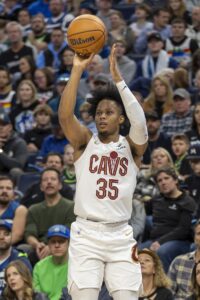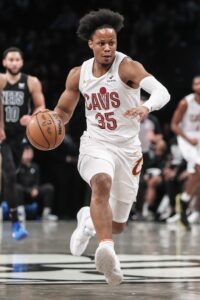The Heat’s Nikola Jovic will, by necessity, likely see the bulk of his minutes at power forward this season. He’s focused on taking advantage of mismatches, according to Ira Winderman of the South Florida Sun Sentinel.
“I would say the biggest thing I was working on the most was when I’m working in the low post, when I have a smaller guy on me, I just have to punish them,” Jovic said. “That’s something I think will help our team a lot. So I would say that’s the main thing for me, other than still being able to spread the floor and everything I already did.”
Jovic, who started 38 of the 46 games he played last season, is eligible for a rookie scale extension next summer.
We have more from the Eastern Conference:
- Shane Battier left his front office job with the Heat in 2021 because he wanted to explore other opportunities outside of basketball, Barry Jackson of the Miami Herald relays. In an episode of the Glue Guys podcast, Battier explained his decision about leaving his post as vice president/basketball development and analytics. “There is so much in life to experience and try my hand at,” he said. “So many interesting people around the world. I’m so fascinated about learning. I turned 46 this week and I feel I have so much to learn and have so much to do in the world still. I needed to go out and explore and meet and learn. I wanted to learn new industries. It sounds very strange because I love basketball. For me to be truly happy, that’s what I need to do.”
- Under the terms of Isaac Okoro‘s three-year contract with the Cavaliers, he’ll have a $10.2MM base salary this season, ESPN’s Bobby Marks tweets. His salary rises to $11MM in 2025/26 and $11.8MM in 2026/27. In addition to the $33MM in guaranteed money, the contract also includes $4.9MM in unlikely incentives. Cleveland is now $1.9MM above the luxury tax line but has the flexibility to get under that figure during the season, if needed, Marks adds.
- The College Park Skyhawks, the Hawks’ NBA G League affiliate, have named Steven Klei as their new head coach, according to Lauren Williams of the Atlanta Journal Constitution. Klei, 31, replaces Ryan Schmidt, who will become a full-time assistant with the Hawks. Aaron Evans has been hired as the Skyhawks’ GM.
 SEPTEMBER 14: The Cavaliers are re-signing restricted free agent
SEPTEMBER 14: The Cavaliers are re-signing restricted free agent  As our Luke Adams
As our Luke Adams